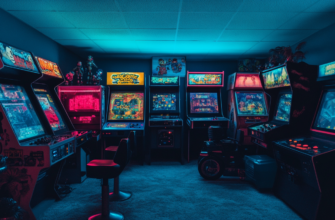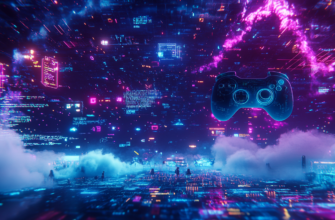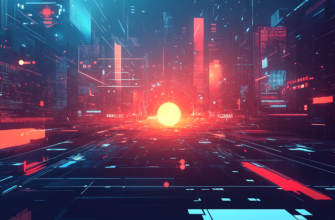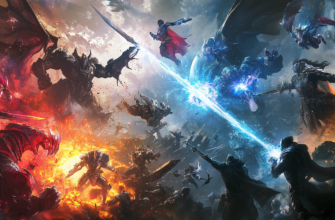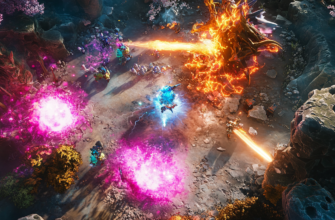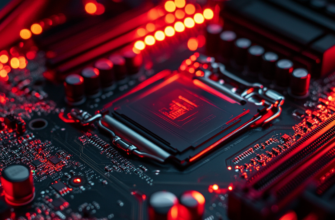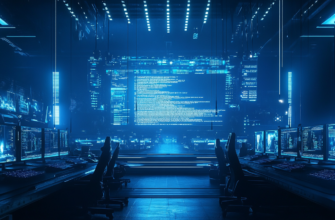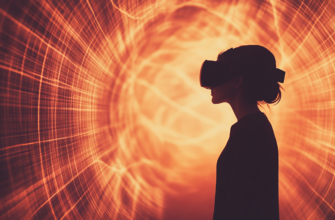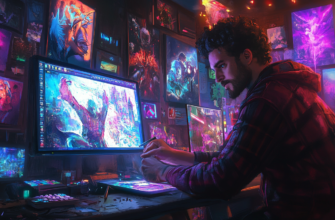- The impact of artificial intelligence on gaming: development and future prospects
- What is artificial intelligence in gaming?
- How AI is shaping game development
- 1. AI-driven NPCs and enemy behaviors
- 2. Procedural content generation
- 3. Personalized gaming experience
- Future developments in AI for gaming
- 1. Advanced machine learning and decision-making
- 2. Enhanced realism in simulations
- 3. Enhanced multiplayer AI competition
- The ethical implications of AI in gaming
- How can gamers stay ahead in an AI-driven world?
The impact of artificial intelligence on gaming: development and future prospects
Yo, fellow gamer! You’ve probably noticed how cutting-edge games have become in recent years. These days, every NPC (non-playable character) seems so intelligent. Could it be that game devs have gotten super creative with their scripts? Well, sure, but an even bigger factor is artificial intelligence (AI). AI has been hyped in pretty much all industries lately, but for gamers like us, it’s been a total game-changer—literally. From smarter enemies reacting to your every move to AI-powered environments that learn from your gameplay, the role of AI in gaming has evolved massively.
But where exactly is this headed? Let’s break it down. Buckle up, and we’ll dive into how artificial intelligence is reshaping games and what’s on the horizon for AI development in gaming.
What is artificial intelligence in gaming?
First, let’s sort out what we mean by artificial intelligence in gaming. In simple terms, AI in video games is the part of the software used to create responsive, adaptive, or even intelligent behaviors in NPCs or the game environment. Historically, AI was all about enemies following fixed patterns, but modern AI isn’t so robotic anymore. With advances like machine learning, we now see NPCs that adapt to players, learn strategies, and behave more like, well, actual humans.
How AI is shaping game development
AI is everywhere, and the gaming industry has been no exception. For the longest time, game developers pushed for better graphics, bigger worlds, and smoother gameplay, but today AI is rapidly becoming their secret weapon for crafting richer, more immersive experiences.
It allows NPCs to act in unpredictable yet believable ways, making the game world feel alive and fluid. But AI isn’t limited to just the bad guys. Whether we are talking about AI-powered procedural generation that helps create vast, varied landscapes (think No Man’s Sky) or NPCs who evolve alongside you, the capacity for AI to influence games is massive. AI’s application in game development can be categorized into three main sections:
1. AI-driven NPCs and enemy behaviors
Gone are the days when enemies would just walk in circles until you swipe at them, rinse and repeat. AI in gaming has made NPCs smarter. AI-powered enemies now analyze your actions and react accordingly. For instance, if you spam the same attack, the AI might learn your pattern and counter it, just like a human opponent would!
Take a game like *Middle-Earth: Shadow of Mordor*. The AI system (called the Nemesis System) changes how enemies behave based on their previous encounter with you, making them more challenging over time. AI ensures that no two battles feel the same, which keeps things fresh and challenging.
2. Procedural content generation
AI has also opened the door to procedural content generation, where algorithms can dynamically generate levels, landscapes, and even entire game worlds. In years past, you’d recognize patterns in levels because human designers created them by hand. Using AI tools, developers can now generate maps that are limitless and varied, often changing with each new playthrough.
Don’t believe me? Just check out *Minecraft* or *No Man’s Sky*. The latter uses procedural generation powered by algorithms which allow it to basically create an infinite universe for you to explore. Imagine—no two players ever visit the exact same locations!
3. Personalized gaming experience
Artificial intelligence is increasingly being used to customize the gamer’s experience. Games are becoming more dynamic, not just in terms of content but in how they adapt to your play style. Ever notice how some games get easier the more you fail, or how competitive games might pair you with similarly skilled opponents? That’s AI at work in matchmaking and difficulty adjustment systems.
For example, in *Alien: Isolation*, the game AI adapts the famous Xenomorph’s behavior depending on how you interact with it, making each play session unpredictable and horrifying (in the best way possible).
Future developments in AI for gaming
So, where is AI in gaming headed? Buckle up, because the future is going to get crazy! Here’s what we can expect in the coming years.
1. Advanced machine learning and decision-making
Right now, AI can “learn” from pre-set data—a process that can predict a player’s actions to some degree. But in the future, machine learning could categorically change gaming, where AI can create new strategies, game mechanics, and tactics mid-game that haven’t been programmed by developers. It’s like playing chess with a master who “learns” new moves on the fly.
Imagine a competitive shooter where the bots don’t just copy human moves from a database but actually develop new attack strategies. I don’t know about you, but that both excites and terrifies me.
2. Enhanced realism in simulations
Simulations are advancing in leaps and bounds thanks to massively improved AI. For instance, in games like *Microsoft Flight Simulator*, AI is used to generate lifelike physics, environmental conditions, and real-world data to create the most realistic experience possible. AI can mimic complex ecosystems—from animal migrations to weather changes—making open-world games feel more alive than ever before.
We’re already seeing AI used in complex simulation games, but that’s nothing compared to what’s coming. Imagine urban simulators that predict real-world outcomes, dynamic worlds where every NPC reacts to every decision you make—down to the smallest choice!
3. Enhanced multiplayer AI competition
Multiplayer games have always been the place where the most competitive games rise to fame, but AI isn’t typically a huge part of multiplayer games… yet. Future AI could potentially introduce more interactive “AI players’ that rival real human opponents in competitive multiplayer, making matchmaking even quicker and reducing lag times for team placements.
In an age where cross-play between systems is becoming more common, AI opponents could fill gaps, allowing for more seamless team match-ups regardless of platform. One day you’ll have AI teammates coordinating online gaming sessions with you as though they were as sharp as your best bro.
The ethical implications of AI in gaming
It’s not all sunshine and rainbows, though. With greater AI comes greater responsibility—yep, I went there. As more artificial intelligence is applied in gaming, there are some ethical concerns to consider.
- Privacy concerns: AI-powered tools like deep learning can track a player’s behavioral patterns. Are we okay with companies collecting massive amounts of data on how we play games? It’s something we should all think about.
- AI replacing human roles: With AI automating so much of the development process, from level creation to player testing, will human developers lose jobs to AI tools?
- Fairness and cheating: AI can get freakishly good at some tasks, almost better than a human, and that could lead to imbalanced experiences. For instance, AI-guided cheats or hacks may become a big issue, and developers will constantly need new ways to check cheating.
How can gamers stay ahead in an AI-driven world?
Honestly, it’s all about rolling with the changes. Just as you’ve adapted to newer graphics, ultra-realistic physics engines, and open-world-level exploration, you’ll adapt to the changes that AI brings. Ensure you’re staying aware of new features, both in terms of competitive play and ethical concerns about data collection and AI oversight in gaming.
And if you’re in the world of game development, now’s a great time to become familiar with integrating AI systems into your work. Tools like Unity and Unreal Engine are already advancing with AI in mind—get ahead by learning how to use them!
Conclusion: The future of AI in games
Artificial intelligence is already reshaping gaming in unimaginable ways, and this is just the beginning. Whether we’re fighting smarter enemies, exploring massive procedural environments, or experiencing personalized gaming interactions, AI has made games more immersive, complex, and downright fun. But as this technology grows, so will its ramifications, both good and bad.
Whatever happens next, one thing is for sure: the future of gaming is set to be mind-blowingly exciting, with intelligent systems making worlds and strategies we’ve yet to even dream of becoming a reality.
Stay on top of it, keep honing your skills, and in the meantime, keep annihilating those AI-driven bosses!



